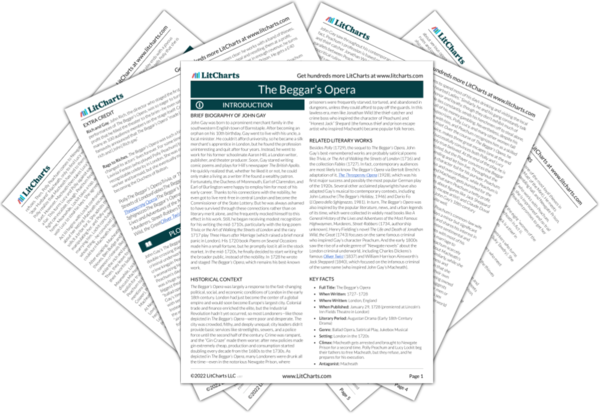Moral Corruption and Hypocrisy
John Gay’s The Beggar’s Opera is set amidst a band of criminals and sex workers in early-18th-century London. The band’s mastermind, Peachum, profits from two jobs on opposite sides of the law: he buys and sells stolen goods, and he turns in the thieves who work for him. Peachum eventually learns that his daughter Polly has secretly married a dastardly highwayman, Macheath, so he carries out several ill-fated plots to have Macheath captured…
read analysis of Moral Corruption and HypocrisyGender, Love, and Marriage
The Beggar’s Opera centers on an unconventional love triangle: the young Polly Peachum and Lucy Lockit each claim Macheath as their husband. Both foolishly expect Macheath to abandon his life of crime, debauchery, and mistresses for an honest marriage with them. And while they spend much of the play trying to get rid of one another, by its end, they realize that the man they call “our Husband” has been manipulating them all along (though…
read analysis of Gender, Love, and MarriageClass, Capitalism, and Inequality
In The Beggar’s Opera, John Gay satirizes a depraved criminal underworld where everything has a price, from stolen goods to human life. Guided by account books rather than conscience, this underworld’s power players—like Peachum and the madam Mrs. Diana Trapes—have learned how to turn theft, exploitation, and violence into profit. Gay depicts these criminal entrepreneurs as little different from ordinary businesspeople: they spend their days calculating costs and prices, hiring and firing employees…
read analysis of Class, Capitalism, and Inequality
Opera, High Art, and Performance
The Beggar’s Opera is in large part a response to Italian operas, which were popular in early 18th-century London. John Gay decided to write a new opera for the masses, which would both build on the Italian operas’ popularity and satirize their elitist conventions. When most operas focused on royalty or characters from mythology, Gay chose to write about thieves and sex workers from London’s lower classes—the kind of folklore antiheroes whom theatergoers would have…
read analysis of Opera, High Art, and Performance






